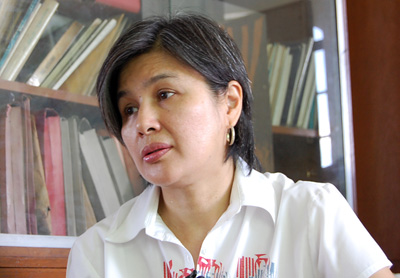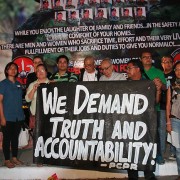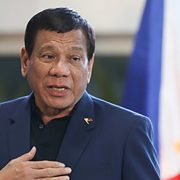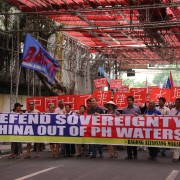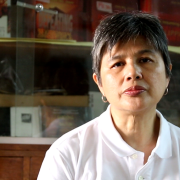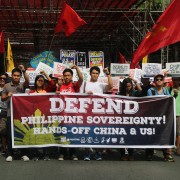STREETWISE: Letter to a grandson on “people power” and revolutionary change by Carol Pagaduan-Araullo
(Photo from Bulatlat.com)
Streetwise
Dear Grandson,
I thought I would write to you and try to explain what EDSA I was all about. The idea came up with all the recent talk about how your parents’ generation does not understand, much less appreciate, what happened thirty years ago, at the “people power” uprising that brought down the brutal and rapacious Marcos dictatorship.
Although I don’t necessarily agree with that sweeping statement, there is some truth to it. Your parents were too young then to really know what was going on. Then they grew up seeing that while the dictator himself was gone, not much else seems to have changed. This experience can be very frustrating and conducive to cynicism and even apathy.
So I thought at the very least, I owe it to you, to do some explaining why our country seems stuck in a rut; economic opportunties are limited; social problems continue to pile up; politicians are a hopeless lot; and many of your uncles and aunts and their friends have decided the only solution is to go abroad to find a decent living and a safer place to raise their families.
At the outset, I must tell you not to take the basic freedoms you enjoy today for granted — freedom of speech; freedom of the press; freedom to rally and petition the government for redress of grievances.
While there are still many unwarranted restrictions on these freedoms today, the point is we absolutely didn’t enjoy them under martial rule. (At least not until many years later, when people had become angrier, more courageous, and better organized such that they began to assert these freedoms regardless of the consequences.)
Most organizations of the people were banned. Student councils and publications were especially targetted; the dictatorship knew that universities are the hotbeds of radical ideas and dissension. Only the Marcos-controlled political party, the Kilusang Bagong Lipunan (KBL) was allowed to exist and rule the stamp-pad parliament.
Defiance of Marcos’ iron rule could mean getting abducted and “salvaged” (outrightly killed without any legal due process); or getting arrested, tortured and spending years in detention without any charges or trial. There were no courts to turn to; no independent newspapers or tv stations where you could expose wrongdoing. No, you couldn’t use social media either; it didn’t exist then as you know it now.
The lower classes bore the brunt of the repression such as peasants fighting landgrabbers and demanding that land be given to those who work on it and not to absentee landlords; workers striking over starvation wages, poor working conditions and the right to form unions; indigenous peoples defending their ancestral land from mining companies and plantations; and urban poor fighting demolition of their shanty towns to give way to shopping malls and so-called development projects.
What is being hailed as the “people power revolution” brought down this repressive rule thirty years ago. All over the country, but most dramatically at the Epifanio de los Santos Avenue (EDSA), the highway between two large military camps where former Marcos henchmen and mutinous military men had holed up, the people rose. They filled EDSA, Mendiola and other thoroughfares in urban centers with their warm bodies for four days until the Marcos family abandoned the presidential palace using helicopters provided by the US government.
It was a heroic undertaking. It took fourteen years – and tens of thousands of lives sacrificed in fighting the dictatorship – to get to that point.
Don’t believe it when they tell you that EDSA was only about Cory Aquino, Cardinal Sin, Defense Secretary Juan Ponce Enrile, General Fidel Ramos and the Reform the Armed Forces Movement (RAM) rebels and their avid followers.
Don’t believe it either when they tell you the Left or the activists from the nationalist and democratic movement were absent at the four-day “people power” uprising. The Left formed the core of the aboveground and underground opposition, consistently carrying the anti-dictatorship movement forward all throughout the dark years. Your grandparents were part of that movement.
Getting rid of the dictatorship was certanly a big improvement but it was not enough. It wasn’t enough to just change leaders, to shift from the old rulers, the Marcoses and favored oligarchs, to the new ones, the Aquinos and their coterie.
Poverty, hunger and ill health are still rampant and widespread, the everyday condition of majority of Filipino families. They are the landless peasants and displaced indigenous peoples; lowly-paid workers and employees with no security of tenure; and the rest of the people who can’t find work or decent sources of livelihood, who are increasingly going abroad as OFWs, becoming odd-jobbers or turning to criminality to survive.
Society’s resources are still monopolized by the landed and big business elite in partnership with multinational corporations and banks. Political power remains in the hands of the oligarchy whose objective is to maintain the status quo utilizing deception and coercion. Periodic undemocratic elections allow their political dynasties to take turns getting richer from graft and corruption. Government officials are subservient to foreign interests, principally the Philippines’ former colonizer, the US of A, that impose anti-people and anti-national policies and programs.
The educational system, mass media outlets and culture as a whole keep the majority of the poor submissive and resigned to their “fate”.
Philippine society — its economy, political and cultural systems — has been in the throes of crisis for a very long time, needing nothing less than a complete, revolutionary overhaul. But EDSA I was not a social revolution in the true sense of the word. The national situation did not change post EDSA I because the promised reforms were never undertaken. The elite who benefitted from EDSA were also the principal defenders of this unjust and decadent system.
That much has become clearer as the years have passed, with six presidencies, several coup attempts, two long-running armed conflicts and another “people power” uprising taking place.
So, dear “apo”, the fight for fundamental reforms in society and government continues long after EDSA I. It is now your parents’ generation – and soon enough – your own generation that will have to take on this historic mission of achieving our people’s great aspirations for prosperity, equality and genuine freedom and democracy.
I sincerely hope, that in due time, you will awaken to this challenge and embrace it. A life of meaning and fulfillment awaits you.
Lovingly,
Lola
Published in Business World
29 February 2016

